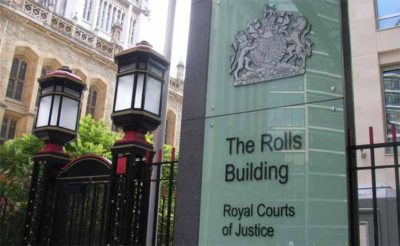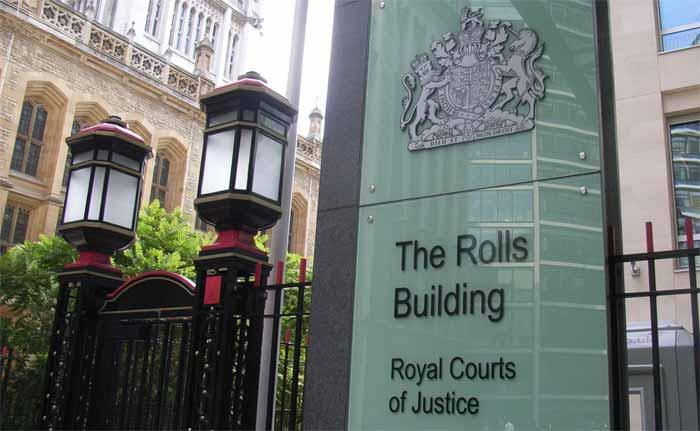
DALRIADA V ARK VICTIMS: “ABUSE OF VULNERABLE MEMBERS OF THE PUBLIC”
The Beddoe proceedings of Dalriada (tPR-appointed independent trustees) v Goldsmith (representative beneficiary for the Ark members) kicked off on 20th June 2017 in the High Court. It was a sweltering day in central London – humid and dusty at the same time. The Ark victims were about to discover that the warning about anomalous and unjust outcomes made by Justice Bean in the High Court in November 2011 was going to be ignored.
Dalriada and their solicitors, Pinsent Masons, and their QC Fenner Moeran sat on the left in the airless courtroom. Mrs Goldsmith and our solicitors, Trowers and Hamlins and QC Keith Bryant, sat on the right. Justice Asplin sat on the bench and prepared to rule on whether 348 Ark victims would have to repay their MPVA loans – and whether Dalriada could use the members’ funds to pay for the recovery proceedings. A group of Ark, Capita Oak and Salmon Enterprises victims and I sat at the back. The only thing we all had in common was that everybody was sweating profusely from the heat.
To put this into context, the Ark victims did indeed all sign loan agreements. However, the loans were intended to be paid back out of the members’ 25% tax-free lump sums available at age 55 – so the term of each loan agreement was calculated to be for the number of years it would take each member to reach 55. By which time, the pension was predicted to have grown by at least 8% per year and would be sufficient to repay the loans. Or so the story went.
Conspicuous by their absence were the various introducers and advisers who sold the Ark schemes and accompanying MPVA (Maximising Pension Value Arrangements) “loans”. By far the most assertive and prolific of these was Stephen Ward of Premier Pension Solutions who sold over £10 million worth of transfers to more than 160 victims. Ward was followed by those who aspired to be as successful as him and these included:
Julian Hanson £5.3m
James Hobson (Silk Financial) £2.3m
Jeremy Dening £2.2m
Michael Rotherforth £961k
Richard Davies £805k
Geoff Mills £794k
Andrew Isles £584k
Amanda Clark £227k
Many of these went on to operate further pension liberation scams – some of which are now also in the hands of Dalriada Trustees. Andrew Isles of Isles and Storer Accountants is still in practice. Stephen Ward still authors the Tolley’s Pensions Taxation Manual.

Interestingly, Stephen Ward, who used Ark to launch a whole series of further pension scams – including several currently under investigation by the SFO and in the hands of Dalriada – claimed in 2014 that “The Ark thing is history now and my involvement with that was administrative”. Of course, neither of those statements was true: Ark is far from being history as, in the wake of the Beddoe proceedings, a whole new chapter of wretched challenges for the Ark victims has only just begun. Ward was the leading promoter, evangelist and advisor to Ark. He had sold over a third of all the transfers – with a total transfer value of more than £10 million.
In fact, Ward and his herd of “introducers” he had recruited from up and down the country (including FCA-registered Gerard Associates which went on to collaborate with Ward in the London Quantum pension scam) – also now in the hands of Dalriada – often assured the victims they would never have to repay the loans.
Fenner Moeran QC, for Dalriada, opened with the lusty confidence of a dashing matador – and who could possibly have failed to be charmed by his persuasive, eloquent, star quality? He reminded me of an actor at the Oscars who knew he was the favourite to win. With his extravagant hand gestures and polished, word-perfect performance, he got into his stride and stayed there – holding court for the whole day with barely a feeble squeak out of our QC.
Moeran’s confidence, however, veered a little too close to cockiness, and he strayed occasionally into the realms of being callously offensive to the Ark victims when he talked about using a “sharp stick” to beat them into submission with threats of bankruptcy. At that moment, he stopped looking like a polished QC and started to look like a mere back-street bully. In fact, it was astonishing that the judge didn’t pull him up on that “foot and mouth” moment, but she appeared to be far too mesmerised by his charming performance to notice – or care.
While I was taking notes, it was really interesting to watch the players’ body language. One can tell an awful lot about what is really going on in people’s heads by what they do with their various body parts. When Moeran was on his feet, Justice Asplin was coquettish, smiley, full of chuckles and did this wiggly thing with her shoulders (like we women do when we are trying to get a bra straight). But when our QC Keith Bryant was on his feet, she sat as still as a statue and peered down at him with a combination of indifference and pity as if he was a dying bull in the afternoon sun.
Mrs Goldsmith sat quietly and showed not a shred of distress as Moeran referred to her and all the other Ark victims as though they were just names on a list, as opposed to human beings – or indeed anything with a pulse. Knowing her well, I am sure she will have felt profound pain and anguish during the whole three days, but not once did either her composure or her dignity slip.
So here is my transcript of the notes I took on what the various parties said during the proceedings – with my comments in bold.
The last thing I personally want to say on the matter, is that something good has to come out of this and my fervent hope is that all those involved in the promotion, sale, administration, introduction, advice, purchase of assets, execution of loans and various other functions will now face justice sooner rather than later. And here, I am actually grateful to my learned fiend’s suggestion of a sharp stick and would propose something more akin to what Vlad The Impaler would have done to these criminals.
TRANSCRIPT OF MY NOTES AT THE HEARING
DAY ONE

Justice Asplin opened with the words “This was a tragedy and an abuse of vulnerable members of the public”. That got us off to a really good start, but curiously the following day she vehemently denied ever having said it. She also denied ever having mentioned Ark and didn’t even seem to know that collectively, the six schemes (Tallton, Grosvenor, Woodcroft, Cranbourne, Lancaster and Portman) were the Ark schemes. Bearing in mind she had had – and been paid for – a whole day’s reading, one would have thought she would have been a little better prepared.
Ark’s Craig Tweedley was quoted as having made a statement that Ark was “designed to unlock amounts of money from people’s pensions in a way which was not taxable”. This is perfectly true – but it went further: it was promoted to the public (both introducers and potential members alike) as an innovative structure which was lawful and tax free. And the principal promoter and recruiter was Stephen Ward. Ward is also a CII Level 6 qualified former pensions examiner and government consultant on pensions and QROPS – so who wouldn’t have believed him?
One of the Ark schemes’ assets – the South Horizon land option in Larnaca, Cyprus – was brought up and reported as having been purchased by Ark for £4 million. But what was not mentioned was that the option had originally been purchased by two football celebrities for £1.1 million and then sold on to Ark for £4 million. And that this pair had gone to accountant Andrew Isles of Isles and Storer to get advice on how to procure further investors in the Cyprus land project. Isles had introduced them to Craig Tweedley and Stephen Ward. In fact, Isles subsequently introduced at least eleven cases to Ark.
It was stated that Craig Tweedley’s associates Andrew Hields and Julian Hanson had purchased all the assets of the schemes and that the sales documentation claimed that some of the funds were “guaranteed “funds and protected by “re-insurance”. Hields and Hanson may well have purchased some of the assets but they will certainly have benefited from handsome investment introduction commissions along the way.
It was also reported that one of the other Ark assets, Freedom Bay, the St. Lucia timeshare development, is now in administration and that none of the investments made met the statements and claims made in the sales documentation. In fact, it did not come out that few – if any – of the victims were ever shown the sales documentation. Most of Stephen Ward’s victims were told the assets would be “high-end residential London property”.
The matter turned to the recovery effort. It was reported that Tweedley had been pursued for the 5% fees taken from scheme members and that although Dalriada had won their claim, of the approx. £1.5 million taken in fees, they only ever actually managed to recover about £20k. This does beg the question as to just how successful Dalriada will actually be in recovering the £9 million in MPVA loans.
In taking steps to recover the loans, it was reported that Dalriada intends to consider the cost vs benefit situation and decide on the approach on a case by case basis, taking each individual case on its merits. It was acknowledged that the chances of recovery were slim and that the costs could be disproportionate to the likely return. The judge asked how many members had received MPVAs and it was disclosed that 348 had and 138 had not. However, nobody raised the question of why such a large number of members had not received an MPVA loan – had they done so it ought to have been disclosed that a significant proportion of transfers were not rejected after Dalriada were appointed.
It was at this point, while examining the possible avenues to recovery, that Moeran’s confidence bubbled over into bald cockiness and he started bragging about using the threat of bankruptcy as a “sharp stick with which to beat the victims into paying back their MPVA loans”. In fact, by now the judge seemed to be very firmly on his side and stated that the members had already agreed to repay the loans and that their only loss was having to repay early. It seemed clear that neither Moeran nor the judge understood – nor had made any attempt to understand – how the loans were sold to the victims. They were told, by Ward and all the others involved in promoting the scheme, that the loans would be repaid out of their pension pots and not out of their own funds. In fact, some people were told they would never have to repay the loans and that each person on either end of the loan transaction would simply agree to tear up their “IOUs”.
Moeran then went on to claim that by repaying the loans, members could avoid the tax charge. Perhaps the HMRC fairy had whispered this in his ear? Or perhaps he was deliberately ignoring the fact that it is HMRC’s position that the loans will remain taxable even if they are repaid.
Towards the end of day one, it was clear that Moeran was confident they were going to win and that the judge would clearly find in favour of Dalriada and against the members. It was also clear that he had the full support of the judge. In fact, Moeran even went so far as to pretty much read out what our QC, Keith Bryant, would be arguing and told the judge what she ought to find against the case he would be putting forward. At some point, I wondered whether Moeran and the judge would be swapping places.
Moeran talked about the methods and costs of taking recovery action against the Ark members. He itemised three issues to take into consideration:
- Merits of taking recovery action
- Cost vs benefit of taking recovery action
- Consequences of not taking recovery action
He then went on to report that Dalriada had 144 signed Standstill agreements and said that Dalriada was intending spending £2,925 per member on court recovery action. The judge declared that that was on the low side as that cost could only happen if the claim was uncomplicated and resulted in a quick and easy repayment. She also said she was not confident that bankruptcy proceedings were necessarily appropriate.
She did, however, firmly declare that the Ark members had all shared the “mistaken belief” that the MPVA loans were valid, non-taxable and only repayable by the end of the originally-agreed loan term. She broke this “mistaken belief” down into four points:
The members’ “mistaken beliefs”:
- The trustees had the power to make the loans
- The loans were capable of being made valid
- The trustee could transfer beneficial ownership of these monies
- The loans were not unauthorised payments and would not trigger a tax charge
The judge appeared to consider that somehow the members had come to these conclusions all on their own. The reality was, of course, that this was exactly what they were told by Stephen Ward and the herd of introducers and advisers – including a couple of FCA-registered ones. But reality did not seem to concern either the judge or Moeran overly.
The last thing that Moeran said on Day One was to make reference to the revised Standstill agreement – the focus of which was to ensure that criminal proceedings are now taken against all those who were involved in defrauding the Ark victims. The judge read the document herself, giving us a welcome rest from listening to Moeran.
As the first day came to a close, I was beginning to wonder whether I had dreamed the fact that a High Court judge had clearly stated in the High Court that Ark had involved an abuse of members of the public. Her statement had been made in front of a dozen or more witnesses and she had then gone on to deny that she had ever said it in front of the same witnesses who all clearly heard her words. Moeran and the judge had both agreed the Ark sales documentation was false and yet I heard neither of them conclude spontaneously that criminal complaints were now essential.
DAY TWO
Moeran opened with: “We are in the process of agreeing six test cases at the First Tier Tribunal” in relation to the personal tax appeals resulting from HMRC’s treatment of the loans (whether repaid or not) as unauthorised payments. The judge questioned whether members put forward for this role might not be happy. Moeran confidently assured her that there had already been five volunteers. I am not aware that any of these purported volunteers have come from the Class Action. Also, at the last meeting that Mrs Goldsmith, Mr Walters (Salmon Enterprises) and I had with HMRC, we agreed two Ark test cases – one with a loan and one without. Moeran did not appear to be aware of this.
Skating quickly over the tax issue for the members – and studiously ignoring the fact that according to HMRC the tax will remain payable even if the MPVA loans are repaid – Moeran and the judge got back to pondering recovery measures. The judge expressed reservations about bankruptcy proceedings because she said that that would merely release members from liability to the scheme rather than help recovery.
Moeran and the judge then started to discuss which members might not be worth pursuing at all for a variety of reasons. Between them, they concluded that those with very small MPVA loans should be ignored and that they might also have to ignore those outside the jurisdiction of the UK. Moeran reported that there were four members in Northern Ireland; 22 in Scotland, 24 in the EU and four outside the EU – USA, Jersey, Bulgaria and Australia.
Neither Moeran nor the judge were sure whether Bulgaria was in the EU (in fact, of course, it is an EU member). The members and I having complained in the strongest possible terms about Moeran’s use of the term “beating the victims with a sharp stick” the previous day, Moeran then went on to publicly apologise for that statement. To be fair to him, he made a good job of the apology and I am sure that Mrs Goldsmith and other members present appreciated it.
I really don’t remember whether our QC said much or anything at all that day – if he did it was not very memorable, or perhaps I couldn’t hear him terribly well because he muttered apologetically and miserably rather than speaking in Moeran’s strident voice.
The MPVA loans were summarised thus:
50 members with loans between £5k and £9,999
124 members with loans between £10k and £19,999
132 members with loans between £20k and £44,999 (totalling £4m+)
40 members with loans of £50k upwards (totalling £3m+)
The judge opined that the bigger the loan, the bigger the original pension must have been, and therefore the wealthier the member was likely to be. She concluded that these would be the easiest targets for recovery.
Then the judge handed down her judgement. She summarised the claim by Dalriada for Beddoe relief (money to be taken from the members’ funds) for the recovery of the MPVA loans and also to challenge the scheme sanction charge in the Tax Tribunals. She approved both of these, but did not agree that Dalriada should use funds to help the members with their individual tax appeals.
She reported that 152 claims had been written to date and that 12 consent orders had been received. She declared that she believed the claims were strong but expressed reservation as to whether the members were in reality good for the money. She reminded the court that there were 138 members without loans and that Dalriada had a duty to protect their position by recovering loans from as many of the other 348 members as possible.
She determined that it was appropriate that the trustees should be granted the relief they sought – albeit not the entire amount sought. She advised Dalriada to take stock of each individual situation and use their discretion as to whether it was appropriate to continue with the action. She also urged them to take into account relevant factors including the aggressive stance being taken by HMRC and to act as a reasonable trustee.
Finally, she said Dalriada should bear in mind that the individual cost of recovery per member would rise from £2.9k to £3.6k (plus VAT) if bankruptcy proceedings were issued and that those with the very smallest loans ought not to be pursued because of the disproportionate cost of doing do. She said it was difficult to decide where exactly the “watermark” might be and reiterated that bankruptcy might not be appropriate and should not be the first refuge sought and could be used as a “second string to their bow”. She suggested that further directions might need to be sought by Dalriada.
Regarding the scheme sanction tax charge appeal matter, she said it was appropriate to give the relief sought and for Dalriada to take steps to challenge the assessments. She recommended a “ceiling” on the amount to be spent and said that to challenge the £4m in tax sought by HMRC, the amount of £350k + VAT was appropriate.
On the question of paying a further £50k to fund legal representations for members against personal tax assessments, she recommended that the scheme sanction charge and the personal tax appeals should be coordinated. But she expressed a reservation about granting this relief to Dalriada as she felt it was excessive “because of the vagueness of what might take place”. She did not consider that for them to pay a barrister was necessarily a reasonable step to take. Therefore, she did not grant the relief sought.
In summary, therefore, the judge’s determination was as follows:
- Yes to recovering the MPVA loans from as many of the members as possible/practicable
- Yes to paying for the recovery costs out of the members’ funds – at the ideal rate of £2.9k + VAT per member (possibly rising to £3.6k + VAT per member if bankruptcy proceedings were issued)
- Yes to taking £350k + VAT out of the members’ funds to pay for the appeal against the scheme sanction charge
- No to paying £50k + VAT towards the members’ personal tax liability appeals
At the start of the proceedings, Moeran had reminded the court that Dalriada, as the trustee, already had the legal right to recover the loans if they chose to. But they were seeking the necessary relief and directions to do so from the court to protect their position.
DAY THREE
The final day was all about the nitty gritty of how the recovery costs should be apportioned between the six schemes. Moeran and Bryant put forward different suggestions as to whether this should be done on the basis of the value of the assets or the value of the MPVA loans within each scheme, and whether this should be done equally or on a pro rata basis.
The members at the back of the court were by now numb and none of them really paid much attention to what was basically “housekeeping” in terms of internal accounting procedures by Dalriada. One of the judge’s last points seemed to be that Dalriada should take all and any reasonable steps to recover the MPVA loans – but that the only question was what was reasonable. She cautioned that some options should not be taken, but stopped short of saying what they were.



